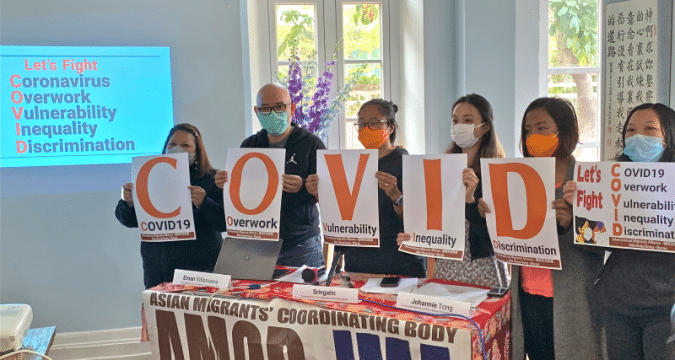
HONG KONG (SE): Migrant rights groups pointed out that many foreign domestic workers face the spectre of inadequate protection during the Covid-19 coronavirus pandemic as shown by a recent survey carried out by the Asian Migrants Coordinating Body (AMCB) with the support of the Mission for Migrant Workers and the Asian Pacific Mission for Migrants. The groups also received complaints about the denial of days off, unreasonable terminations and many other kinds of labour rights deprivations.
The findings of the survey, answered by 1,127 foreign domestic workers of different nationalities from March 8 to 10, were released during a press conference at the KUC Space, Jordan Road, on March 16. The survey was conducted online so that workers who were not allowed to go out could also respond.
Fourteen per cent of those interviewed said that their employers never gave them any masks or sanitisers. Among them, more than 70 per cent said their employers, on the other hand, gave masks and sanitisers to other members of the household.
Of those who received masks from employers, 25 per cent said they felt they got fewer masks compared with the other members of the household.
Eight out of 10 respondents had to buy their own masks or sanitisers. More than 85 per cent said prices for these products are expensive even though they are generally available in the market.
More than half of the respondents claimed that they had more work to do over the past month as they were told to do more cleaning, cooking and child caring.
However, some said they were not given any gloves when they were repeatedly told to clean the house with strong cleaning detergents, like bleach or Dettol.
As many as 40 per cent of respondents said they were not allowed to go out in the past month due to the pandemic. Almost 20 per cent said they were not given their weekly rest day over the past month.
Sringatin, spokesperson of the Asian Migrants Coordinating Body, said employers should let workers enjoy their holidays and trust that they can take preventive measures on their own. She observes that most workers wear their masks, regularly clean their hands, keep social distance and avoid crowds. The group also provides temperature checking services in Central. She said a holiday is important for workers as it helps to relieve their stress.
Eman Villanueva, another spokesperson of the AMCB, said the survey was not about creating confrontation between employers and their workers, but quite the opposite. “We are just making an appeal for all to take care of one another even though we have inadequate supply at present,” adding that leaving any group without protection resources will only give the virus a chance to spread and put society at risk.
He said there are good and responsible employers, but the groups are worried that the pandemic has given a chance for bad employers to further deprive workers of their rights.
Johannie Tong Hui-yan, community relations officer of the Mission for Migrant Workers, said the group has received a lot of inquiries about labour rights starting from the end of January.
Some workers said they were denied holidays, asked to take unpaid leave or were terminated due to the financial difficulties of employers. Some were told by their employers to resign when they insisted on going out on their days off.
She shared that one worker was even told by her female employer to share a bedroom with her male employer after he came back from China and was supposed to be in home quarantine, while her female employer slept with her ward in another room.
In another case, a worker with a fever was isolated in her own room but not given any medical attention. She was told to take seven days leave without pay until she recovered.
Tong said when some workers sought help from the Labour Department, they found that the offices of the Labour Relations Division were closed for a month while other government departments offered limited services.
According to the figures provided by the Centre for Health Protection, as of mid-March, a total of five foreign domestic workers were infected with coronavirus after their employers were confirmed infected. The groups said it highlights the need for better protection of foreign domestic workers in their workplace.
They urged the government to provide foreign domestic workers with updated information related to the pandemic, particularly the confirmed cases concerning foreign domestic workers.
They believe the government should also educate the employers on how to protect their workers, such as by giving them adequate protective materials.








